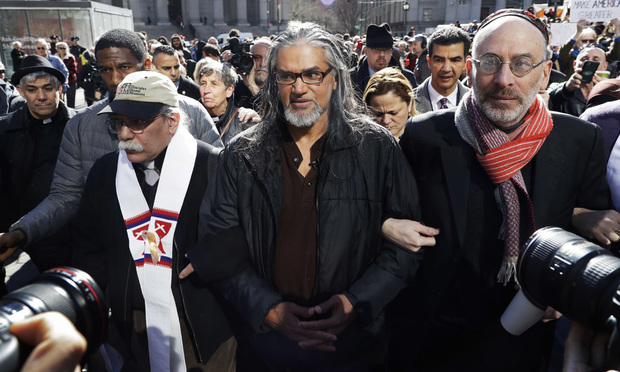Split 2nd Circuit Panel Finds 'Outrageous' ICE Conduct Revives Activist's Removal Suit
The majority found the actions taken against immigration activist Ravidath Ragbir qualified for a special exception to review his constitutional claims against being deported.
April 25, 2019 at 05:44 PM
7 minute read
 Ravidath Ragbir, center, executive director of the New Sanctuary Coalition and a Trinidad-born immigrant who works to protect New York's immigrant families from detention and deportation, walks with supporters as he arrives for his annual check-in with Immigration and Customs Enforcement (ICE) in New York. (AP Photo/Mark Lennihan, File)
Ravidath Ragbir, center, executive director of the New Sanctuary Coalition and a Trinidad-born immigrant who works to protect New York's immigrant families from detention and deportation, walks with supporters as he arrives for his annual check-in with Immigration and Customs Enforcement (ICE) in New York. (AP Photo/Mark Lennihan, File)
Immigration officials' deportation actions taken toward an outspoken critic of the Trump administration's policies were “outrageous” enough to justify a First Amendment defense against removal, a divided U.S. Court of Appeals for the Second Circuit panel ruled Thursday.
Circuit Judges Pierre Leval and Christopher Droney said statements made by the Immigration and Customs Enforcement field director in New York City about Ravidath Ragbir's public comments and actions ahead of an attempt to deport him constituted retaliation against speech that “implicates the apex of protection under the First Amendment.”
“Ragbir's plausible allegations and evidence, which we must accept as true at this juncture, support that the Government singled him out for deportation based not only on the viewpoint of his political speech, but on the public attention it received,” Droney stated, writing for the majority. “To allow this retaliatory conduct to proceed would broadly chill protected speech, among not only activists subject to final orders of deportation but also those citizens and other residents who would fear retaliation against others.”
Attempts to deport Ragbir, a leader of New Sanctuary Coalition of New York City, have driven headlines since a high-profile confrontation with ICE officials at their office in Manhattan in March 2017.
Ragbir filed the petition under review the day before a February 2018 scheduled check-in with ICE officials for which he was told to bring luggage in anticipation of deportation. He claimed he was being retaliated against because of his public opposition to ICE, and sought a halt to plans to deport him on the basis of his protected speech.
In May 2018, U.S. District Judge P. Kevin Castel of the Southern District of New York dismissed Ragbir's claim. He found federal immigration law deprives courts of jurisdiction over challenges to valid final orders of removal, including claims based on the U.S. Constitution.
The district court went on to find no basis to investigate the Constitution's habeas corpus protections under the suspension clause as Ragbir didn't state a recognized constitutional claim. Critically, Castel cited the U.S. Supreme Court's 1999 decision in Reno v. American-Arab Anti-Discrimination Committee. The district court noted the high court's accepting of a rare case “so outrageous” it can overcome the presumption of no constitution right to assert selective enforcement as a defense against deportation. Castel, however, declined to extend that exception to Ragbir.
In a detailed analysis on appeal, the panel majority disagreed with the district court. Applying the multistep analysis compelled by the American-Arab decision, the appellate court found Ragbir's political speech represented the peak of First Amendment protection, and that the retaliation he faced from government officials over the exercise of that speech was “egregious.”
Specifically, the panel noted comments made by ICE Field Office Director Scott Mechkowski to a New York City minister complaining about the protests Ragbir and others regularly held outside ICE's office, and how comments in the press negatively portrayed immigration officials.
“Nobody gets beat up in the news more than we do, every single day. It's all over the place, …how we're the Nazi squad, we have no compassion,” Mechkowski allegedly told the minister, according to the majority.
“A plausible, clear inference is drawn that Ragbir's public expression of his criticism, and its prominence, played a significant role in the recent attempts to remove him,” Droney wrote. “The conclusion that ICE would nonetheless still be free to deport Ragbir on the basis of his advocacy would certainly draw considerable media attention and thus would be a particularly effective deterrent to other aliens who would also challenge the agency and its immigration policies.”
Continuing, the majority found the more recent decision by the Supreme Court in 2010's Padilla v. Kentucky supported the idea that Ragbir had a substantial interest in avoiding deportation based on his speech, as “deportation is indeed a punishment for lawful permanent residents who, like Ragbir, are rendered removable because of a criminal conviction.”
Lastly, the majority found the discretion provided to the government in removal proceedings was less concrete in Ragbir's case, as he had been a lawful permanent resident made deportable after a criminal conviction. He was neither illegally in the country, nor under an obligation to depart prior to deportation, the majority noted. In fact, he was able to secure numerous stay orders and work permits.
The panel majority proceeded to address Ragbir's constitutional question. The government argued Ragbir shouldn't qualify for even the most basic habeas corpus protections provided by the Constitution because he isn't seeking release of custody because he hasn't challenged his final removal order, let alone being in the government's custody at all pending the outcome of court proceedings.
The panel majority disagreed, finding in precedent ample support for the idea that Ragbir—with his continued check-ins and imminent threat of deportation—was, in fact, in the government's custody. Finding that the district court does, in fact, have the ability to do fact-finding during a habeas petition—with the Habeas Corpus Act of 1867 making a cameo appearance in the majority's decision—the majority remanded the suit back to the district court, with a stay on removal in place until future proceedings before Castel.
In his dissent, Circuit Judge John Walker Jr. argued that the retaliation against Ragbir ended the day the district court issued a stay on removal proceedings in his case. Given the Trump administration's fervent removal policies, it would be “implausible” to assume Ragbir, a convicted felon, would not be lawfully targeted for removal, Walker argued, and therefore he would not have remanded the case.
He also took issue with the majority's declaration that it was not attempting to define what constituted “outrageous” for purposes of the Arab-American decision, when the majority created “from whole cloth a five-factor test” to do just that. In doing so, Walker worried “it will become an open door for evading the will of Congress,” which sought to bar virtually all judicial oversight in the area.
Ragbir was represented on appeal by a legal team led by Arnold & Porter Kaye Scholer partner R. Stanton Jones. In a statement, he called the majority's decision “a warning to this administration to end its pattern of retaliating against immigrant-rights activists across the country.”
In a statement of his own, Ragbir expressed his appreciation for the support he has received.
“It humbles me to know that not only will my voice be protected, but that together we can protect the voices of so many people who are living in this country under the threat of deportation,” he said. “It was all of our voices together that made this decision possible and we have to continue to speak out against the travesty of our deportation system.”
A spokeswoman for the U.S. Attorney's Office in Manhattan declined to comment. A spokeswoman for ICE did not respond to a request for comment.
Related:
Cuomo Signals Support for Bill to Protect Immigrants From ICE Raids at State Courthouses
New Rules Limit ICE's Arrest Ability in New York State Courts
Immigrants Avoiding State Courts, Legal Services Due to ICE Presence, Report Says
This content has been archived. It is available through our partners, LexisNexis® and Bloomberg Law.
To view this content, please continue to their sites.
Not a Lexis Subscriber?
Subscribe Now
Not a Bloomberg Law Subscriber?
Subscribe Now
NOT FOR REPRINT
© 2025 ALM Global, LLC, All Rights Reserved. Request academic re-use from www.copyright.com. All other uses, submit a request to [email protected]. For more information visit Asset & Logo Licensing.
You Might Like
View All
Five Years After Vega Much Remains Unsettled in Pay Frequency Litigation

Spotify GC Steps Down, Opts to 'Step Away From Full-Time Corporate Life'
2 minute read
Dechert Sues Former Attorney For Not Returning Compensation

Trending Stories
- 1CLOs Face Mounting Pressure as Risks Mushroom and Job Duties Expand
- 2X Faces Intense Scrutiny as EU Investigation Races to Conclusion & Looming Court Battle
- 3'Nation is in Trouble': NY Lawmakers Advance Bill to Set Parameters for Shielding Juror IDs in Criminal Matters
- 4Margolis Edelstein Broadens Leadership With New Co-Managing Partner
- 5Menendez Asks US Judge for Bond Pending Appeal of Criminal Conviction
Who Got The Work
J. Brugh Lower of Gibbons has entered an appearance for industrial equipment supplier Devco Corporation in a pending trademark infringement lawsuit. The suit, accusing the defendant of selling knock-off Graco products, was filed Dec. 18 in New Jersey District Court by Rivkin Radler on behalf of Graco Inc. and Graco Minnesota. The case, assigned to U.S. District Judge Zahid N. Quraishi, is 3:24-cv-11294, Graco Inc. et al v. Devco Corporation.
Who Got The Work
Rebecca Maller-Stein and Kent A. Yalowitz of Arnold & Porter Kaye Scholer have entered their appearances for Hanaco Venture Capital and its executives, Lior Prosor and David Frankel, in a pending securities lawsuit. The action, filed on Dec. 24 in New York Southern District Court by Zell, Aron & Co. on behalf of Goldeneye Advisors, accuses the defendants of negligently and fraudulently managing the plaintiff's $1 million investment. The case, assigned to U.S. District Judge Vernon S. Broderick, is 1:24-cv-09918, Goldeneye Advisors, LLC v. Hanaco Venture Capital, Ltd. et al.
Who Got The Work
Attorneys from A&O Shearman has stepped in as defense counsel for Toronto-Dominion Bank and other defendants in a pending securities class action. The suit, filed Dec. 11 in New York Southern District Court by Bleichmar Fonti & Auld, accuses the defendants of concealing the bank's 'pervasive' deficiencies in regards to its compliance with the Bank Secrecy Act and the quality of its anti-money laundering controls. The case, assigned to U.S. District Judge Arun Subramanian, is 1:24-cv-09445, Gonzalez v. The Toronto-Dominion Bank et al.
Who Got The Work
Crown Castle International, a Pennsylvania company providing shared communications infrastructure, has turned to Luke D. Wolf of Gordon Rees Scully Mansukhani to fend off a pending breach-of-contract lawsuit. The court action, filed Nov. 25 in Michigan Eastern District Court by Hooper Hathaway PC on behalf of The Town Residences LLC, accuses Crown Castle of failing to transfer approximately $30,000 in utility payments from T-Mobile in breach of a roof-top lease and assignment agreement. The case, assigned to U.S. District Judge Susan K. Declercq, is 2:24-cv-13131, The Town Residences LLC v. T-Mobile US, Inc. et al.
Who Got The Work
Wilfred P. Coronato and Daniel M. Schwartz of McCarter & English have stepped in as defense counsel to Electrolux Home Products Inc. in a pending product liability lawsuit. The court action, filed Nov. 26 in New York Eastern District Court by Poulos Lopiccolo PC and Nagel Rice LLP on behalf of David Stern, alleges that the defendant's refrigerators’ drawers and shelving repeatedly break and fall apart within months after purchase. The case, assigned to U.S. District Judge Joan M. Azrack, is 2:24-cv-08204, Stern v. Electrolux Home Products, Inc.
Featured Firms
Law Offices of Gary Martin Hays & Associates, P.C.
(470) 294-1674
Law Offices of Mark E. Salomone
(857) 444-6468
Smith & Hassler
(713) 739-1250






